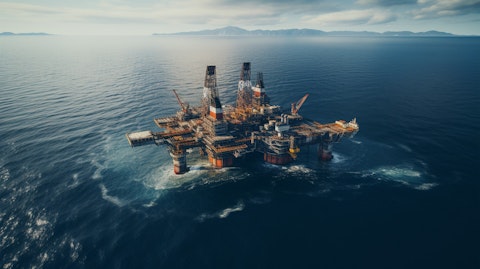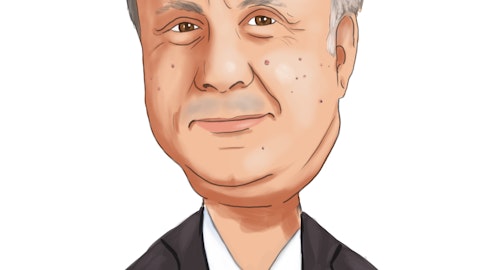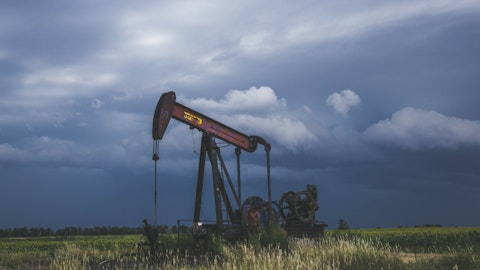GeoPark Limited (NYSE:GPRK) Q3 2023 Earnings Call Transcript November 9, 2023
Operator: Good morning. And welcome to the GeoPark Limited Conference Call following the Results Announcement for the Third Quarter Ended September 30th, 2023 and 2024 work program and investment guidelines. After the speaker’s remarks, there will be a question-and-answer session [Operator Instructions]. If you do not have a copy of the press release it is available at the Invest with Us section on the company’s corporate Web site at www.geo-park.com. A replay of today’s call may be accessed through this webcast in the Invest with Us section of the GeoPark corporate website. Before we continue, please note that certain statements contained in the results press release and on this conference call are forward-looking statements rather than historical facts, and are subject to risks and uncertainties that could cause actual results to differ materially from those described.
With respect to such forward-looking statements, the company seeks protections afforded by the Private Securities Litigation Reforms Act of 1995. These risks include a variety of factors, including competitive developments and risk factors listed from time-to-time in the company’s SEC reports and public releases. Those lists are intended to identify certain principal factors that could cause actual results to differ materially from those described in the forward-looking statements, but are not intended to represent a complete list of the company’s business. All financial figures included herein were prepared in accordance with the IFRS and are stated in US dollars unless otherwise noted. Reserves figures correspond to PRMS standards. On the call today from GeoPark is Andrés Ocampo, Chief Executive Officer; Veronica Davila, Chief Financial Officer; Augusto Zubillaga, Chief Technical Officer; Martin Terrado, Chief Operating Officer; James Deckelman, Chief Exploration Officer; and Stacy Steimel, Shareholder Value Director.
And now I will turn the call over to Mr. Andrés Ocampo. Mr. Ocampo, you may begin.
Andrés Ocampo: Good morning, everyone, and thank you for joining our call. We are here today in Bogota with our team to report our third quarter results and next year’s work program and budget guidelines. During the third quarter, GeoPark invested $44 million, drilled 14 wells and produced approximately 35,000 barrels a day equivalents, impacted by temporary production shut-ins in CPO-5, which were restored in late September. Production today is at approximately 39,000 barrels a day equivalent. The company recorded revenues of $192 million and adjusted EBITDA of $115 million, a margin of 60%, which means that, for every dollar invested, GeoPark generated approximately $2.60. As a result, net profits reached $25 million or $0.44 per share.

Over the last 12 months, our return on capital employed was 42%. In 2023, GeoPark continues to return value to its shareholders, which ensure buybacks and dividends expects to exceed $50 million, including the announced dividend of $7.5 million to be paid in December. This should be above the target of 40% to 50% of free cash flow for the year. After investing in our assets, servicing our debt and taxes, as well as distributing cash back to shareholders, GeoPark ended the quarter with $160 million in cash on the balance sheet and a net leverage ratio of less than 1 times. Our 2023 drilling campaign continues to deliver positive results, particularly from our accelerated activity during the second half of the year with 12 rigs working. Multiple new plays are being opened by our team and portfolio, which are adding new exciting operational and delineation activity for the remainder of this year and next.
The horizontal well campaign in Llanos 34 with the most recent well producing over 3,400 barrels a day currently has two full time rigs executing back-to-back wells and is expected to continue. The Toritos discovery in the general basins is flowing 1,300 barrels of oil per day and represents a new exciting stratigraphic play in the Paleocene, which we will continue to appraise and delineate. Zorzal Este, another Paleocene prospect, is showing positive preliminary loggin information and will be tested in the next couple of weeks, may also open more drilling opportunities. The Halcon 1 well in CPO-5, which is showing positive preliminary logging information will be tested in the next couple of weeks and will be followed by Perico 1 well in the same Paleocene [plain and terrain].
The Houston new play in Ecuador developed by our exploration team with three successful wells already plowing 2,700 barrels of oil per day and more to come. Our 2024 drilling campaign will be focused on continuing the development in Llanos 34 with water flooding project and horizontal wells campaign, as well as on embracing and delineating the new place being opened by the 2023 program. As always, the work program and guidelines are flexible and can be adopted based on changes in oil prices or other conditions as well as drilling results. We expect to invest $150 million to $200 million to drill 35 to 45 wells and produce between 37,000 and 40,000 barrels per day with production growth expected to come from Colombia and Ecuador, partially offset by Brazil and Chile, which have no capital allocated.
We expect to generate between $420 million and $550 million in adjusted EBITDA at $80 to $90 Brent. Approximately 20% to 30% of our CapEx will be allocated to exploration and the rest will be allocated to appraisal, delineation and development activities as well as facilities. We are also executing the third largest 3D seismic acquisition program in Colombia across two Blocks adjacent to CPO-5 complemented also by an additional seismic program within the CPO-5 block. We expect this large new seismic information will allow our subsurface team to define and map new potential prospective areas in place. As always, after fully funding our CapEx program, we will continue to allocate our cash flow to return value to shareholders and continue to strengthen our balance sheet.
We expect to return approximately 40% to 50% of our free cash flow after taxes and debt service back to shareholders through a combination of our base dividends, share buybacks and/or extraordinary dividends. We are finishing the year with great results, which are positioning GeoPark for an even better 2024. We look forward to continue delivering and reporting on our progress the incoming quarters. Thank you. And we will now take your questions.
See also 12 Dogs of the Dow Dividend Stocks to Buy and Top 20 Diamond Producing Countries in the World.
Q&A Session
Follow Geopark Ltd (NYSE:GPRK)
Follow Geopark Ltd (NYSE:GPRK)
Receive real-time insider trading and news alerts
Operator: [Operator Instructions] First question comes from Alejandro Demichelis from Jefferies.
Alejandro Demichelis: A couple of questions, please. The first one is on production. Could you please give us some granularity on how you see that production into next year evolving? Because it has given us quite a wide range of production. And then the second one is your production costs has been a little bit high this quarter. Maybe you can give us some kind of indication of how you see that production cost evolving over time, say over the next 12 months? And then on the exploration side, you have made some good progress. Maybe you can give us some more detail on how you are seeing Zorzal, how you see Halcon, and what excites you in the program that we have for the next 12 months, please?
Martin Terrado: I’ll start with the first question that you ask around production for 2024 and more granularity, and then I’ll pass it on to Andrés and Veronica. So for 2024, our average for the year would be between 37,000 and 40,000 barrels of oil equivalent per day, that’s around 1% to10% increase from 2023. And when we look at each of the assets Platanillo and Chile, they will be declining around 10% to 30%. As Andrés mentioned, there’s no development capital allocated to these two assets. If we move to Brazil, in Brazil, we expect flat production. Llanos 34 will be flat to slightly decline. And then in CPO-5 and Llanos exploration blocks, we expect growing. So overall, Colombian Ecuador production we expect an increase of 3% to 11%.
Veronica Davila: Moving onto your question on production cost. We’ve seen an increase in production cost over the past quarter. A few significant drivers of this, on the one side energy cost in Colombia that have rise given a linear weather pattern. We saw a significant increase in the third quarter, it has since receded a bit and started to stabilize, but that accounted for about 50% of the increase that we saw in the third quarter ‘23 alone. Additionally, the peso has appreciated — the Colombian peso has appreciated. It was about 10% in the third quarter, also affected our local currency denominated costs, which are about 70% of production costs. One factor that is particular to the third quarter has to do with the composition of sales.
So we have a drop in inventories for Putumayo and Oriente assets, those have higher overall production costs than [Indiscernible] assets and so they move that averages, but those are factors that tend to even over time. All in all, for 2023, we still expect the consolidated production cost to be about $10 to $11 per BOE in line with guidance that we previously provided. If we look to 2024, we still expect to see pressure both from energy cost in Colombia and from inflation. The guidance that we provided yesterday within a work program includes $160 million to $170 million worth of OpEx that equates to about $12 per BOE considering volumes produced. I have to say, our team will continue to focus on implementing cost efficiency initiatives and we look forward to doing that over the next year.
Andrés Ocampo: So to comment on your question about which excites us from this new activities or this new place. We really believe these are more or less the four or five we mentioned in the introduction and in the release that are really exciting new opportunities. I’ll start with the horizontal well campaign in Llanos 34 that is really delivering great results with the last horizontal well having been drilled and completed at more than 35% cost saving to the first one. And it was put on production a lot faster is also flowing 3,500 barrel a day, that’s really exciting. And having two rigs working on that play back to back also makes us really excited about that. In terms of the things that — exploration opportunities have been opened up this year, all of them are slightly different and exciting for different reasons.
The Toritos oil play is Guadalupe, Paleogene formation, stratographic type of traps. So as you know like it happened in Tigana and Jacana, which are mostly stratographic plays in that same formation, stratographic traps tend to be more risky or difficult to find, but once you find them, usually are associated with bigger volumes. So we expect to add more wells before the end of the year. And the campaign for next year also has some significant appraisals and development drilling in that new opportunity. All of these plays, we’re getting results as we speak. Some of them have been testing for a couple of weeks, some of them are going to be testing for the next few weeks. So obviously, it’s very preliminary everything we can say now but we look forward over the course of the next few months as we add more activity to this and have more info information to them.
Hopefully, we can be more precise and give more details on what does it mean in terms of volumes and activity. Zorzal is an up deep well from the discovery earlier this year in the Zorzal 1 well, so we just drilled Zorzal Este 1 well. It encountered about 40 feet of net pay, net oil pay in the Guadalupe formation is a downturn structural trap. If you remember back in 2012 when we discovered the Tigui field in the Llanos basin, it was the first, the Tigui field was the first downturn fielding in the basin that was discovered, and that opened a new play. And following that, we had a number of discoveries in the basin. So that is exciting, because it’s another downturn structural trap that we discovered. So right now, as I said, the logging information is showing more or less 40 feet of oil pay with no [indiscernible] contact in that formation.
So looking forward to test this well. I mean, so far the result looks encouraging. But obviously as always, we need to put the barrels on the tank before we celebrate. But if the testing is successful, we see a lot more activity coming from that field. Halcon is very important for us, because it’s in CPO-5, it’s in the northern part of the block. And if you remember when we purchased Amerisur some years ago, we had multiple reasons for that acquisition. But one of those reasons was because we saw there was a lot of potential in the Guadalupe formation up in the northern part of the block. Halcon 1 was a well to — that we were drilling to hopefully prove that thesis. So again, this is a well that we’re going to be testing in the next couple of weeks.
But the logging information today is showing that there’s an oil play with no oil water contact in that area. Also, given these results, we have already agreed with the operator that there’s going to be a second well drilled back-to-back to it. So once Halcon is tested and completed, we’re going to move to Perico 1 to continue delineating this new plate that is open in the northern part of the block. So also, very excited about that. And the last one is Ecuador. And in Ecuador, our geoscience team developed a new geological model to track the traffic mechanism of the Usan inside of some of our blocks. And we’ve drilled already three wells, three successful wells following this model, producing 2,700 barrels a day of gross oil. Today, the production in Ecuador is 3 times what it was last quarter.
So we also think this opens up a lot of activity and opportunities for us to continue leading and operating this new play. So again, I am sorry, I didn’t give you a short answer or which ones we are excited most, but I think these five are the biggest highlights from what we can say. And also, I would like to take the opportunity that we are talking about exploration. I would like to introduce James Deckelman, who is our new CXO, who recently joined the management team. He is with us on the call and will probably in the future be taking these questions. But James, if you want to add anything I may have missed.
James Deckelman: I would like to begin by first saying that I am very pleased to be a part of this leadership team on a very, very high caliber, working assets of such high quality and basins that are so very prolific. These are basins that I worked earlier in my career and is very pleased and I’ll be levering that experience and success here at GeoPark, principally in three areas; one is organic and inorganic growth; secondly, to expand our organizational capabilities; and the third thing is to develop some differential technologies. So again, very, very pleased to be here. Since I joined the company quite recently, with respect to your question regarding what we are very excited about, I would reinforce some of the comments that were made by Andrés.
And what’s really of interest to me are the high volume demographic stratigraphic concepts that we are now developing both in Colombia and in an Ecuador. What’s germane here are two key points. One is the volume potential of these traps and also the play repeatability. And what we are seeing in the Toritos play, for example, is clear repeatability within Block 123, therefore, significant scope for additional volume potential as well as possible extension into CPO-4.
Alejandro Demichelis: As a small follow-up, because Andrés, you mentioned the [Indiscernible] you didn’t mention the [Indiscernible] outcome. Could you give us some kind of range on the [Indiscernible]?
Andrés Ocampo: It is more or less 25, 30 feet, which is similar to what we’ve seen in other parts of being that formation in other parts of that area. So it’s more or less within what we expected.
James Deckelman: And just adding to that, that well also intersected no water contact, which is very, very important as well.
Operator: Next question comes from Stephane Foucaud of Auctus Advisors.
Stephane Foucaud: I have got a few. First looking at 2024 production guidance. Given the level of activities and the new [feed] entering production, it looks a bit conservative. So I was wondering whether you could give us a sense of why you would expect production to be at the end of 2024 when the Llanos 123, 87 and Ecuador are in full production that would help us, I think, me to have a view on it where 2025 could be in production? So that’s my first question. Second, on 123 and 87, what do you think from what you see so far and the development program, what do you see being the production capacity of each of these fields [indiscernible] bit early stage, but you might already have some sense of that? And lastly what — do you expect to pay any cash tax in Colombia in Q4 ‘23? And if yes, how much?
Martin Terrado: I’ll cover the first one around production exit for 2024 and then I’ll pass it on to Andrés and Veronica again. So for 2024, as Andrés mentioned in the initial remarks, the average will be 37,000 to 40,000 barrels of oil equivalent per day. And as you can imagine next year, it’s going to have significant appraisal activity in this cover field. So the exit will depend on the learnings and the results of these fair ways that we will be appraising. In Ecuador, we’re going to be drilling between two and seven appraisal wells. In Llanos exploration, three to nine wells. So at this point, that’s as much as we can share.
Andrés Ocampo: So I think Stephane, both the first and second question, this is what is different about next year’s program is that it has a — maybe a more significant component of delineation and appraisals than maybe in the past couple of years. I think in the past couple of years it was either development or new exploration and it was very easy development, we associate production and exploration. We don’t. In delineation and appraisals, there’s some risking associated with it. And you can see that the range of activity on each one of this delineation place is pretty wide. I mean, some of it goes to, I think in Ecuador we’re going to do something like two to seven wells and I think in Llanos exploration goes from three to nine wells.
So that’s a pretty wide range. And the reason for that is because we’re in early stages. We’re seeing what we’re seeing is encouraging. We hope we can be on the upper side of the range. And if we are there, then yes, we would be on the de-risking side of the play. And hopefully what that brings is a lot more upside on the production side than what we’re showing in our guidance. So probably that is the main reason why it sounds a little odd, the level of activity compared with the level of production that we’re showing. Also part of the production as it was mentioned by Martin, it is offset by three assets that we have that are producing today collectively something around 4,000 barrels a day that are not getting any capital associated that are going to be declining.
So that offsets a little bit the corporate production growth.
Veronica Davila: So as you well know, income taxes in Colombia are paid primarily in the second quarter. So the bulk of our cash taxes we have already paid for this year. Now on every quarter we do have withholding taxes that are part of that cash tax payments. And so if we look at the fourth quarter, we would expect on and about $10 million to $20 million of those to be paid for during the quarter and that is included and in line with the guidance we’ve provided previously.
Operator: [Operator Instructions] I’ll now hand the call back to Mr. Andrés Ocampo for any concluding remarks.
Andrés Ocampo: Thank you everybody for your interest and your support, and we’re always here to answer any questions you may have. Please reach out and we encourage you to visit in our fields and our operations or call at any time for further information. So thank you, and have a good day.
Follow Geopark Ltd (NYSE:GPRK)
Follow Geopark Ltd (NYSE:GPRK)
Receive real-time insider trading and news alerts


